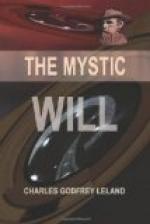PARACELSUS clearly states that by the power of Foresight—he uses the exact word, Fuersicht—Man may, aided by Sleep, attain to knowledge— past, present or future—and achieve Telepathy, or communion at a distance. In the Fragmenta, Caput de Morbis Somnii he writes:
“Therefore learn, that by Foresight man can know future things; and, from experience, the past and present. Thereby is man so highly gifted in Nature that he knows or perceives (sicht), as he goes, his neighbor or friend in a distant land. Yet, on waking, he knows nothing of all this. For God has given to us all—Art, Wisdom, Reason—to know the future, and what passes in distant lands; but we know it not, for we fools, busied in common things, sleep away, as it were, what is in us. Thus, seeing one who is a better artist than thou art, do not say that he has more gift or grace than thou; for thou hast it also, but hast not tried, and so is it with all things. What Adam and Moses did was to try, and they succeeded, and it came neither from the Devil nor from Spirits, but from the Light of Nature, which they developed in themselves. But we do not seek for what is in us, therefore we remain nothing, and are nothing.”
Here the author very obscurely, yet vigorously, declares that we can do or learn what we will, but it must be achieved by foresight, will, and the aid of sleep.
It seems very evident, after careful study of the text, that here, as in many other places, our author indicates familiarity with the method of developing mental action in its subtlest and most powerful forms. Firstly, by determined Foresight, and, secondly, by the aid of sleep, corresponding to the bringing a seed to rest a while, and thereby cause it to germinate; the which admirable simile he himself uses in a passage which I have not cited.
PARACELSUS was the most original thinker and the worst writer of a wondrous age, when all wrote badly and thought badly. There is in his German writings hardly one sentence which is not ungrammatical, confused, or clumsy; nor one without a vigorous idea, which shows the mind or character of the man.
As a curious instance of the poetic originality of PARACELSUS we may take the following:
“It is an error to suppose that chiromancy is limited to the hand, for there are significant lines (indicating character), all over the body. And it is so in vegetable life. For in a plant every leaf is a hand. Man hath two; a tree many, and every one reveals its anatomy—a hand-anatomy. Now ye shall understand that in double form the lines are masculine or feminine. And there are as many differences in these lines on leaves as in human hands.”
GOETHE has the credit that he reformed or advanced the Science of Botany, by reducing the plant to the leaf as the germ or type; and this is now further reduced to the cell, but the step was a great one. Did not PARACELSUS, however, give the idea?




